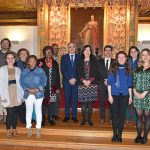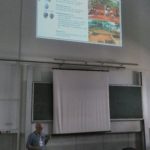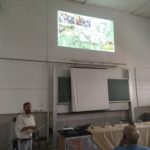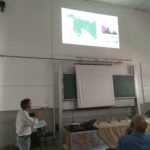On March 5, at 3 pm, Koen Bostoen presents at talk titled “Epidemic-driven population collapse in Congolese rainforest 1600-1400 years ago urges reassessment of the Bantu Expansion” for the DiaLing research group.
Category: Conferences
BantuFirst research on online “Extracting the Past from the Present” conference
The BantuFirst project team presented three talks during the online conference “Extracting the Past from the Present”, an international and interdisciplinary conference on African precolonial history organized by the ERC-SG BantuRivers project at ULB:
- “How to Retrieve Lost Paths in the Rainforest?” by Koen Bostoen, Wannes Hubau, Sara Pacchiarotti and Dirk Seidensticker
- “New Genetic Light on Old Linguistic Questions from the West-Coastal Bantu Homeland” by Cesar Fortes-Lima, Carina Schlebusch, Leon Mundeke, Sara Pacchiarotti and Koen Bostoen
- “Weeding the Bantu Banana Plot: Lexical Reconstruction and Ancient Musa History in Africa” by Sifra Van Acker, Sara Pacchiarotti, Edmond De Langhe & Koen Bostoen
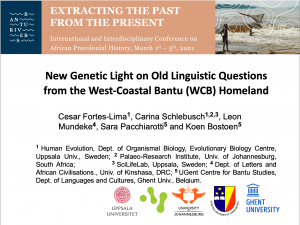
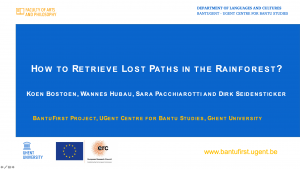
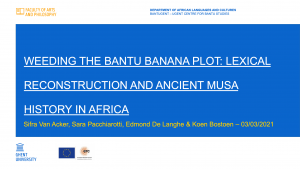
More than just words: A celebration of southern African languages on the occasion of the UNESCO Year of the Indigenous Languages
On November 11-13, 2019 Sara Pacchiarotti participated in the interdisciplinary conference “More than just words: A celebration of southern African languages on the occasion of the UNESCO Year of the Indigenous Languages” organized by Dr. Anne-Maria Fehn in close collaborations with African partners (San Research Center at the University of Botswana) and hosted at the CIBIO-InBIO lab in Vairão (Portugal). The conference brought together people from linguistics, cultural anthropology and the biological sciences, including speakers of Khoisan languages and Bantu languages from Botswana, Namibia and Angola, in order to highlight the importance of indigenous languages and indigenous knowledge in research and biodiversity conservation. Sara Pacchiarotti presented a talk in co-authorship with Koen Bostoen titled “Contact between non-Bantu speaking autochthonous hunter-gatherers and Bantu speakers in Central Africa: New linguistic insights from the BantuFirst Project”.
Heidi Goes presents her ongoing PhD research in Cabinda
On October 25, 2019, Heidi Goes had the opportunity to present some of her research on the Kikongo Language Cluster (a discrete branch within West-Coastal Bantu) at the first-ever conference on the languages of Cabinda in Cabinda. She was the only foreign participant and attracted quite some media attention, amongst others from Jornal de Angola (November 3 issue).
.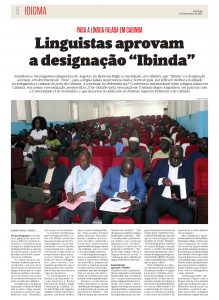
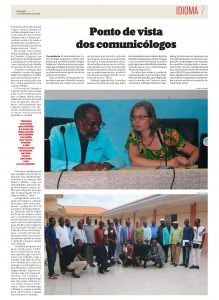
Peopling History of Africa: A Multidisciplinary Perspective
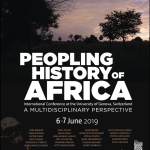 On June 6-7 Koen Bostoen and Sara Pacchiarotti attended the “Peopling History of Africa: A Multidisciplinary Perspective” conference in Geneva (Switzerland). They presented together the invited talk The first Bantu speakers south of the Equatorial Rainforest: preliminary new evidence from historical linguistics and archaeology, including preliminary results from the linguistic and archaeological research carried out so far within the BantuFirst project. This conference was organized by Anne Mayor (Anthropology Unit) and Alicia Sanchez-Mazas (Department of Genetics and Evolution) of the University of Geneva and aimed at gathering a number of outstanding international researchers active in different fields in order to present a comprehensive view of our present knowledge about the peopling of Africa.
On June 6-7 Koen Bostoen and Sara Pacchiarotti attended the “Peopling History of Africa: A Multidisciplinary Perspective” conference in Geneva (Switzerland). They presented together the invited talk The first Bantu speakers south of the Equatorial Rainforest: preliminary new evidence from historical linguistics and archaeology, including preliminary results from the linguistic and archaeological research carried out so far within the BantuFirst project. This conference was organized by Anne Mayor (Anthropology Unit) and Alicia Sanchez-Mazas (Department of Genetics and Evolution) of the University of Geneva and aimed at gathering a number of outstanding international researchers active in different fields in order to present a comprehensive view of our present knowledge about the peopling of Africa.
Africa, the cradle of human diversity: Joining cultural and biological approaches to uncover African diversity
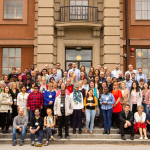 On May 22-25 Koen Bostoen, Bernard Clist and Sara Pacchiarotti participated in the Conference “Africa, the cradle of human diversity: Joining cultural and biological approaches to uncover African diversity” in Uppsala (Sweden). The conference was organized by Carina Schlebusch (Associate Professor and leader of the Schlebusch, Human Evolution Program, Department of Organismal Biology, Uppsala University) and her team members Cesar Fortes-Lima (Postdoctoral researcher in Population Genetics), Ezekia Mtetwa (Researcher in Archaeogenomics) and Cécile Jolly (Research Engineer). Koen Bostoen presented the invited talk The first Bantu speakers south of the Central-African rainforest: New insights from historical linguistics and archaeology, which included results obtained within linguistics and archaeology after the first year of the BantuFirst project. Bernard Clist presented the invited talk West-Central African diversity from the Stone Age to the Iron Age, continuities and transitions during the last 10,000 years. Before the very start of the conference, Sara Pacchiarotti presented the invited talk Untangling the West-Coastal Bantu Mess: Identification, Geography and Phylogeny of the Bantu B50-80 Languages during a Mini-Workshop on African Linguistics. The conference was also an opportunity to coordinate imminent linguistic fieldwork with genetic sampling in the DRC. If all goes well, the latter will be conducted by Ezekia Mtetwa and Cécile Jolly.
On May 22-25 Koen Bostoen, Bernard Clist and Sara Pacchiarotti participated in the Conference “Africa, the cradle of human diversity: Joining cultural and biological approaches to uncover African diversity” in Uppsala (Sweden). The conference was organized by Carina Schlebusch (Associate Professor and leader of the Schlebusch, Human Evolution Program, Department of Organismal Biology, Uppsala University) and her team members Cesar Fortes-Lima (Postdoctoral researcher in Population Genetics), Ezekia Mtetwa (Researcher in Archaeogenomics) and Cécile Jolly (Research Engineer). Koen Bostoen presented the invited talk The first Bantu speakers south of the Central-African rainforest: New insights from historical linguistics and archaeology, which included results obtained within linguistics and archaeology after the first year of the BantuFirst project. Bernard Clist presented the invited talk West-Central African diversity from the Stone Age to the Iron Age, continuities and transitions during the last 10,000 years. Before the very start of the conference, Sara Pacchiarotti presented the invited talk Untangling the West-Coastal Bantu Mess: Identification, Geography and Phylogeny of the Bantu B50-80 Languages during a Mini-Workshop on African Linguistics. The conference was also an opportunity to coordinate imminent linguistic fieldwork with genetic sampling in the DRC. If all goes well, the latter will be conducted by Ezekia Mtetwa and Cécile Jolly.
Contested Millets in Africa and Asia: Past and Present
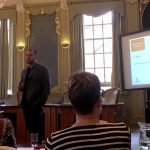 On March 28-29, 2019, Koen Bostoen, Sifra Van Acker and Sara Pacchiarotti participated in the International Workshop on “Contested Millets in Africa and Asia: Past and Present” in Groningen (Netherlands), which was organized by Peter Berger (University of Groningen) and Roland Hardenberg (Frobenius Institut für Kulturanthropologische Forschung an der Goethe-Universität Frankfurt). They presented an invited lecture titled “On the rise and fall of millets in Bantu speech communities of Central Africa: Insights from historical linguistics and archaeology“, which included preliminary results from Sifra’s ongoing historical-linguistic PhD research within the BantuFirst project.
On March 28-29, 2019, Koen Bostoen, Sifra Van Acker and Sara Pacchiarotti participated in the International Workshop on “Contested Millets in Africa and Asia: Past and Present” in Groningen (Netherlands), which was organized by Peter Berger (University of Groningen) and Roland Hardenberg (Frobenius Institut für Kulturanthropologische Forschung an der Goethe-Universität Frankfurt). They presented an invited lecture titled “On the rise and fall of millets in Bantu speech communities of Central Africa: Insights from historical linguistics and archaeology“, which included preliminary results from Sifra’s ongoing historical-linguistic PhD research within the BantuFirst project.
18th Meeting of the Congo Basin Forest Partnership
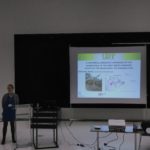
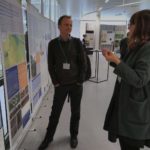
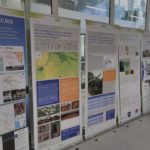 On November 27, 2018, on-going research of the BantuFirst team was presented in Tervuren at the 18th Meeting of Partners of the Congo Basin Forest Partnership, which focused on the environmental dynamics of the Congo Basin.
On November 27, 2018, on-going research of the BantuFirst team was presented in Tervuren at the 18th Meeting of Partners of the Congo Basin Forest Partnership, which focused on the environmental dynamics of the Congo Basin.
Dirk Seidensticker and Katharina Jungnickel presented a poster titled “New Archaeological Research on the Earliest Remains of Sedentary Groups South of the Central-African Rainforest”, which highlighted the preliminary results of the project’s first fieldwork conducted during the summer of 2018. The study area, which has received very little attention from archaeologists so far, is situated in between the Congo Basin and the Lower Congo region. The chrono-cultural sequences of these two areas are impossible to link on the basis of existing collections.
A second poster titled “Historical-Linguistic Approach to the Subsistence of the First Bantu Speakers South of the Rainforest: The Banana Case” was presented by Sifra Van Acker and co-authored by Sara Pacchiarotti and Koen Bostoen. This poster presented preliminary results of Sifra’s ongoing PhD research on the reconstruction of subsistence-related vocabulary in Proto-West-Coastal-Bantu as part of the project’s wider historical-comparative linguistic research. The banana case is highly relevant because it is still not clear when, how and by whom bananas were introduced in Africa and which role they played in the diet of early Bantu speakers and in the expansion of their languages through Central Africa.
15th Congress of the PanAfrican Archaeological Association for Prehistory and Related Studies in Rabat, Morocco
The project’s aims and first results have been presented at the 15th Congress of the PanAfrican Archaeological Association for Prehistory and Related Studies in Rabat (Morocco) on September 12, 2018. Bernard Clist discussed “The first villages of Central Africa before 1500 BP” while Dirk Seidensticker presented “New archaeological research on the earliest villages south of the Central-African rainforest”. The two presentations were part of a special session organized by Bernard Clist, Pierre de Maret and Thomas Huffman covering “Early villages and farming through African humid forests, from Central Africa southwards”.
The presentation of Bernard Clist gave an overview of Pre- and Early Iron Age groups in the western parts of Central Africa, especially in Gabon and the coastal areas of the two Congo states. The presentation included a detailed discussion of the known remains of past subsistence strategies. Dirk Seidensticker presented the first results of the project’s 2018 archaeological fieldwork campaign by himself and Katharina Jungnickel, including the first excavation of the site of Mukila since 1952 and the first-ever survey along the road from Kinshasa to Bandundu. Due to the virtually total lack of archaeological research within the Mai-Ndombe, Kwango and Kwilu provinces of the Democratic Republic of the Congo, these new findings will be pivotal for establishing the basis for future research.
24th Annual Meeting of the European Association of Archaeologists (EAA2018) in Barcelona, Spain
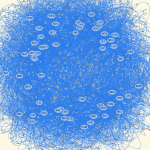 During the EAA meeting of 2018 Dirk Seidensticker, together with Florian Thiery, Allard Mees (both Römisch-Germanisches Zentralmuseum Mainz) and Clemens Schmid (Kiel University) presented their research on “RDF based modeling of relative and absolute chronological data: Examples from the central african rainforest and roman periodisation”. The method presented untangles hidden assumptions that are part of the way archaeologists build chronologies. Chronological intervals are sometimes based on absolute “certain” datings (e.g. C14) or derived from relative dating or combinations of both. Chronological relations between entities are modeled using Allen`s interval algebra within a RDF graph in order to produce a machine readable and processable semantic representation. The presentation can be accessed via Zenodo and the code is available via GitHub.
During the EAA meeting of 2018 Dirk Seidensticker, together with Florian Thiery, Allard Mees (both Römisch-Germanisches Zentralmuseum Mainz) and Clemens Schmid (Kiel University) presented their research on “RDF based modeling of relative and absolute chronological data: Examples from the central african rainforest and roman periodisation”. The method presented untangles hidden assumptions that are part of the way archaeologists build chronologies. Chronological intervals are sometimes based on absolute “certain” datings (e.g. C14) or derived from relative dating or combinations of both. Chronological relations between entities are modeled using Allen`s interval algebra within a RDF graph in order to produce a machine readable and processable semantic representation. The presentation can be accessed via Zenodo and the code is available via GitHub.
